Treatment

During your treatment you will go to your mental health workers and GP regularly.

Talking therapy
Talking therapy is when you communicate with a mental health worker to learn ways to cope with how you think or feel.

If you are having talking therapy your mental health worker may ask you to practise skills you learn at home.

For example they may give you sheets to fill in at home to note down the feelings you have during the week.

Medicine
If you are taking medicine your GP or psychiatrist may want to see you every few months.

If you are taking medicine it can help to note down if you have any side effects.

A side effect is an unpleasant effect of medicine on your body or thinking.
A side effect can make you feel unwell.
Some medicines can give you side effects.

You can use a diary to note down any side effects you have from your medicines.
You can ask someone you trust to support you to use your diary.

You can use IDMH Connects Medication Side Effects Diary to note down any side effects.
For more information go to https://www.idmhconnect.health/
medication-side-effects-diary
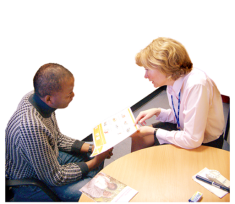
You can show this diary to your doctor.
Your doctor can help you if you have side effects.
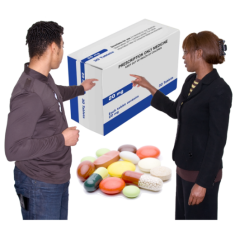
Your doctor can let you know what medications you take and what side effects you may have.
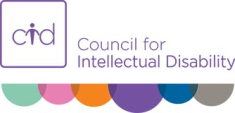
The Council for Intellectual Disability has a factsheet on taking medicines.
For more information go to https://cid.org.au/resource/me-and-my-medication-guide/

There are also lots of factsheets on different medicines.
You may like to ask someone you trust to look at the factsheets with you.
For more information about different medicines go to https://www.birmingham.ac.uk/
research/activity/ld-medication-guide/downloads/medicine-information.aspx
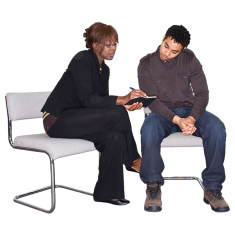
Support
You can ask someone you trust for support during treatment.

They can speak to your mental health workers about how they can help you if you want.

It is OK if you do not want them to speak to your mental health workers.

Diary
You could keep a diary about
- What has helped you
- What has not worked

This can help to plan your care in the future.

You can also use IDMH Connects My Health Passport to note down treatments you have had before.
For more information go to https://www.idmhconnect.health/my-mental-health-passport

If you are very mentally unwell you may have to stay in a hospital.

You are very mentally unwell when you cannot cope with your feelings and thoughts.

Hospital mental health workers can

- Help you to communicate how you feel

- Suggest other treatments like medicine that may help you

You may feel scared if you have to stay in hospital.
This is very normal.

But there are people who can support you.
Hospital staff

In hospital you can ask to communicate with someone if you are worried or scared.
This could be a
- Nurse
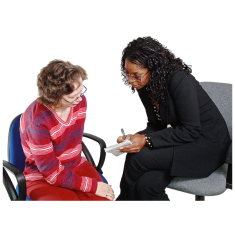
- Social worker
A social worker is a mental health worker who helps you find the support you need to stay well.

- Psychologist

- Counsellor

If someone else on the ward is worrying you then you can tell hospital staff.
They can help you.
Official visitor
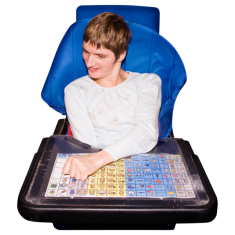
You can ask to communicate with an Official Visitor in the hospital.

Official Visitors make sure people who are getting mental health care are treated well.
Official Visitors do not work for the hospital.

You may want to communicate with an Official Visitor if

- You have an idea for how the hospital can treat you better
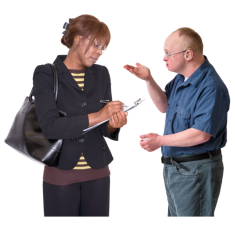
- You want to make a complaint.
A complaint is when you let someone know you are not happy with something.

Below is a list of information to support your mental health treatment.

For more information about
- Cognitive behavioural therapy go to https://www.healthdirect.gov.au/
cognitive-behaviour-therapy-cbt
- Mindfulness go to https://www.healthdirect.gov.au/mindfulness

The Council for Intellectual Disability has a factsheet on taking medications.
For more information go to https://cid.org.au/resource/me-and-my-medication-guide/

There are also lots of factsheets on different medications.
You may like to ask someone you trust to look at these with you.
For more information about different medications go to https://www.birmingham.ac.uk/
research/activity/ld-medication-guide/downloads/medicine-
information.aspx

The Home Medicines Review factsheet lets you know how you can get advice on the medicines you take.
This factsheet helps you check you are not taking too much medicine.
For more information go to https://www.countrysaphn.com.au/wp-content/uploads/2022/10/Medicines-Review_Easy-Read_FINAL.pdf

For more information about
- Being a voluntary patient go to https://www.3dn.unsw.edu.au/
sites/default/files/documents/
3DN_MHA_Voluntary_ERv1.pdf
- Your rights as a voluntary patient go to
https://www.3dn.unsw.edu.au/
sites/default/files/documents/
3DN_Rights_Voluntary_ERv1.pdf

For more information about
- Being an involuntary patient go to https://www.3dn.unsw.edu.au/
sites/default/files/documents/
3DN_MHA_Involuntary_ERv1.pdf
- Your rights as an involuntary patient go to https://www.3dn.unsw.edu.au/
sites/default/files/documents/
3DN_Rights_Involuntary_ERv1.pdf

For more information on getting help in other areas of your life go to
- The Disability Gateway https://www.disabilitygateway.gov.au/
- NDIS website https://www.ndis.gov.au/
- Services and supports https://www.idmhconnect.health/other-services-types-health-workers/ER
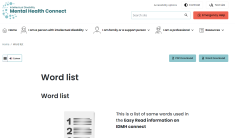
There are some tricky words in this Easy Read sheet.
For more information about these words go to